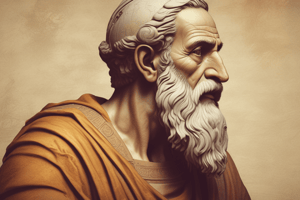Podcast
Questions and Answers
What does Herodotus claim about Egypt?
What does Herodotus claim about Egypt?
Egypt is the gift of the Nile
Who was the Greek historian that reported many events, including those about Egypt?
Who was the Greek historian that reported many events, including those about Egypt?
Herodotus
How many workmen did Herodotus report labored annually on the Great Pyramid?
How many workmen did Herodotus report labored annually on the Great Pyramid?
400,000
According to calculations, what is the maximum number of men that could have worked on the Great Pyramid at one time?
According to calculations, what is the maximum number of men that could have worked on the Great Pyramid at one time?
The Great Pyramid at Gizeh was completed in ten years.
The Great Pyramid at Gizeh was completed in ten years.
The Great Pyramid once rose to a height of _____ feet.
The Great Pyramid once rose to a height of _____ feet.
What method did the builders of the Great Pyramid use to orient its sides?
What method did the builders of the Great Pyramid use to orient its sides?
Match the following terms with their descriptions:
Match the following terms with their descriptions:
A _____ number system was used by the Egyptians.
A _____ number system was used by the Egyptians.
What is a characteristic of the blocks used in the Great Pyramid's construction?
What is a characteristic of the blocks used in the Great Pyramid's construction?
Flashcards are hidden until you start studying
Study Notes
Herodotus and Ancient Egypt
- Herodotus (485-430 B.C.), known as the "Father of History," emphasized reporting accounts without necessarily believing them.
- His significant journeys included regions such as the Black Sea, Asia Minor, and Egypt.
- He famously stated, "Egypt is the gift of the Nile," acknowledging the river's importance to Egyptian civilization.
The Great Pyramid of Giza
- Erected around 2600 B.C. for Pharaoh Khufu, known to Greeks as Cheops.
- Herodotus reported that 400,000 workers labored for 30 years, divided into groups of 100,000, though calculations suggest a maximum of 36,000 workers could be accommodated simultaneously.
- Construction required ten years to build a road to the limestone quarry, using 2,300,000 stone blocks averaging 2.5 tons each.
Construction Details
- Blocks were precision-fitted, with joints so tight that a knife blade could not fit between them.
- The Great Pyramid was the largest structure of its time, originally rising to 481.2 feet (31 feet have since eroded).
- Its base covered 13 acres—comparable to combining the base areas of several major cathedrals in Europe.
Architectural Accuracy
- The pyramid's base was nearly a perfect square, with a deviation of only 4.5 inches across its sides averaging 755.78 feet.
- Builders used celestial bodies for orientation, achieving alignment with the cardinal points with minimal error.
Ancient Egyptian Numeral System
- The numeral system was non-positional, indicating that the value of a numeral did not change based on its position.
- Representations included symbols like a horseshoe for the number 1, a tadpole for 2, and other unique shapes for different numbers.
- The system utilized a decimal structure (decem = ten) but lacked a place-value system.
Symbolism in Numerals
- Different symbols represented various quantities and concepts, such as fingers to signify numbers and floral designs like the lotus flower reflecting cultural significance.
- The use of a person's hands to denote numbers showcased the blend of practical counting methods with cultural imagery.
Studying That Suits You
Use AI to generate personalized quizzes and flashcards to suit your learning preferences.




